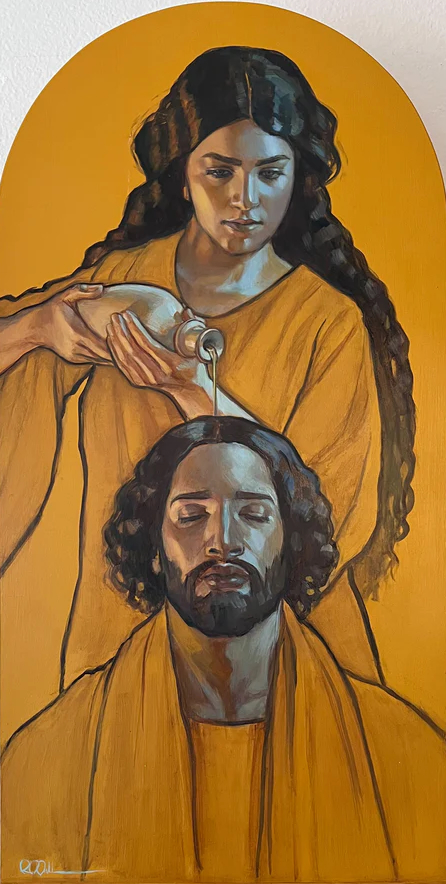The Advent Project: Week 2Chikamu

Dec. 13: An Extravagant Gift: A Beautiful Act

Anointing for Burial, Rose Datoc Dall. Oil on canvas.
“Pie Jesu” from the album Requiem. Performed by Sarah Brightman and Paul Miles-Kingston, composed by Andrew Lloyd Webber.
Poetry:
“Anointing”
by Maria Lisella
as the winter sky cools on its way to night.
You ask me “… before you go, can you …” And I do.
Unwilling to go, needing to go, I organize items
on the table, as if anointing them for you, talk you
through the maze of meds, the need to eat something,
anything all day. I swirl and spin the hospital furniture --
the walker, the tables into place. Your prayer books
next to the phone, small laboratory cups of mouth
washes for who remembers why there are three of them.
I make my way to Second Avenue, chase the subway car,
look up to see a woman giggling. I must have missed
a transient, funny incident on the platform. She wants
me to join her, I do, smile back, blink and recall the last thing
you asked. “Would you take a hot cloth, wash my face …”
as my grandmother did on cold mornings knowing
each child would tiptoe on chilled wooden planked floors
as my mother did for me to gentle me into mornings.
I reach my stop and think quite possibly, I forgot
to warm your face as night falls in a place where
the weather never changes, where you live just for me.
AN EXTRAVAGANT GIFT: A BEAUTIFUL ACT
“I have no say, no position, and I am valueless … Who am I in this world if I am no one in the sight of culture, society, decision-making?
“Sometimes I wonder whether men will ever understand that women are human beings and have equal rights to decisions, to be part of society.”
“In India, it's still male dominated. To make a way for yourself gets very difficult sometimes, because we are not taking a woman as a human being.”
The above words come from women in rural India who participated in a study conducted by me and a Biola research team in the winter of 2007. These women were struggling to be recognized at a most fundamental level—to be seen as human. Can you imagine living in a culture where your voice and presence is constantly devalued? The devaluing of Indian women begins at birth. In many parts of India, a common greeting toward a pregnant woman is, “May you be the mother of a hundred sons.” In other words, if you are the mother of a son you are blessed; to have a daughter is seen as a burden.
What is God’s reaction to women who are often devalued and unseen in many parts of the world?
In today’s passage, Christ elevates the status of women by singling out the actions of one woman and commands that what she has done for him should be told whenever the gospel is proclaimed. What actions are worth such an enduring tribute?
While in Bethany, Christ stays in the home of Simon the Leper. He reclines at a table as a woman comes into the room with a vial of extremely expensive perfume. She shocks everyone by breaking the vial and pouring it over Jesus’ head. Those watching, led by Judas, are indignant. They are of the opinion that the perfume has been wasted when it should have been sold to assist the poor. Jesus disagrees. What the disciples call wasteful, he describes as beautiful. One New Testament scholar notes: “Mark translates the Greek wordkalos as ‘good work’ (vrs. 6), but in its larger meaning, it conveys a sense of beauty that gives goodness and artistic glow beyond its instrumental value.” At the heart of social justice is the idea that everyone’s words, actions, and perspectives are worthy of our attention and acknowledgement. Christ acknowledges the actions of this woman—who is not even named—and commands that “wherever the gospel is preached throughout the world, what she has done will also be told, in memory of her” (Mk. 14:9). As we read this devotional today, her testimony lives.
“Who am I in this world if I am no one in the sight of culture?” tragically asks an Indian woman. Barbra Myerhoff, in her study of abandoned senior citizens in a secluded Jewish nursing home, concluded that “unless we exist in the eyes of others, we come to doubt our own existence.” This Advent season let’s treat everyone we meet—neighbors, classmates, Amazon delivery people, and especially those ignored by society—as if they really exist and are, like Jesus modeled, truly seen.
Prayer:
Jesus, today let us look upon others with new eyes. Let us not rush past others but take a moment to see them as you did. A simple smile as person rushes by communicates that they do exist; you are special to me and our Savior.
Amen
Tim Muehlhoff
Professor of Communication
Co-director of the Winsome Conviction Project
Biola University
For more information about the artwork, music, and poetry selected for this day, please visit our website via the link in our bio.
Zvinechekuita neHurongwa uhu

Biola University's Center for Christianity, Culture & the Arts is pleased to share the annual Advent Project, a daily devotional series celebrating the beauty and meaning of the Advent season through art, music, poetry, prayer, Scripture, and written devotions. The project starts on the first day of Advent and continues through Epiphany. Our goal is to help individuals quiet their hearts and enter into a daily routine of worship and reflection during this meaningful but often hectic season. Our prayer is that the project will help ground you in the unsurpassable beauty, mystery, and miracle of the Word made flesh.
More









